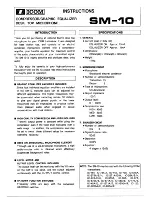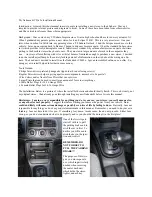
4
5
REMOTE CONTROL
1. SLEEP BUTTON
2. MODE BUTTON
3. CLOCK BUTTON
4. TIMER BUTTON
5. NUMERIC BUTTONS
6. VOICE BUTTON
7. EQ BUTTON
8. BASS +/- BUTTONS
9. /- BUTTONS
10. MUTE BUTTON
11. STANDBY BUTTON
12. TUNING/SKIP/SEARCH BACKWARD
BUTTON
13. TUNING/SKIP/SEARCH FORWARD
BUTTON
14. MEM BUTTON
15. PAIR/PLAY/PAUSE BUTTON
16. MUSIC BUTTON
17. MOVIE BUTTON
18. VOL +/- BUTTONS
19. CH+/- BUTTONS
POWER SUPPLY
Plug AC plug into the outlet socket for connecting the main power.
SLEEP TIMER SETTING
You can set the sleep timer at power on modes as following instructions:
During playback, press the SLEEP button on the remote control repeatedly to cycle through
the sleep time options, Release the SLEEP button when your desired sleep time shows on
the screen. Once the sleep time is expired, the unit will be switched off.
During playback, press SLEEP button once to check the remaining sleep time.
HOW TO SET TIME
At the standby mode, press and hold the CLOCK button on the remote until Hour flashes on
the screen; use the TUNING/SKIP/SEARCH buttons on the remote to adjust the hour and
confirm your adjustment by pressing the CLOCK button on the remote; Minute starts
blinking on the screen, press the TUNING/SKIP/SEARCH buttons on the remote to set the
minute accordingly, press the CLOCK button on the remote again to confirm your setting.
During playback, press the CLOCK button on the remote to check the current time.
Note: The time only could be set at standby mode.
TIMER SETTING
1. At standby mode, press and hold the TIMER
button on the remote. The hour will begin
blinking on the screen with the flashing timer icon “T”.
2. Press the TUNING/SKIP/SEARCH buttons on the remote to adjust the hour.
3. Press the TIMER button to confirm. The minute on the display will begin blinking.
4. Press the TUNING/SKIP/SEARCH buttons on the remote to adjust the minute.
5. Press the TIMER button on the remote to confirm your setting.
6. After the set time is reached, the unit will power on to the radio automatically.
7. The timer function can be deactivated or activated by short pressing the TIMER button on
the remote.
USB & SD/MMC CARD PLAYBACK
1. Power on the unit, insert an USB or a SD/MMC card into the unit.
2. Press MODE button repeatedly to switch to USB or card mode. The playback will start
automatically.
3. Press the TUNING SKIP/SEARCH FORWARD button on the remote to skip to the next
track; press and hold to search through the track forward.
4. Press the TUNING SKIP/SEARCH BACKWARD button on the remote to skip to the
previous track; press and hold to search through the track backward.
5. Use the numeric buttons to enter the track number to select your desired track for
playback.
BLUETOOTH OPERATING
This unit can receive stereo audio signal from a BLUETOOTH stereo audio source device.
1. Power on the unit, switch to BLUETOOTH mode by pressing MODE button repeatedly.
2. LED indicator rapid blinking while it is pairing.
3. Enable the Bluetooth of the Bluetooth audio source device.
4. Pair and connect to SBBT1203(the unit) on the audio source device. If prompted for
passcode, enter “0000”.
5. Pairing successful (LED indicator blue), ready to stream music.
6. During playback, press PLAY/PAUSE button to cease or resume the playback.
7. During playback, press TUNING/SKIP/SEARCH FORWARD button to skip to the next
track; press TUNING/SKIP/SEARCH BACKWARD button twice to skip to the previous
track.
8. During playback, press and hold TUNING/SKIP/SEARCH buttons to search through the
current track forward or backward.
Note:
Pairing mode is canceled about 1.5 minutes.
The above are generic steps to pair a BLUETOOTH device, for more specific instructions
on BLUETOOTH connectivity for your device, please consult your manufacturer’s
manual.
Once the unit enters to the BLUETOOTH mode, it will connect to the last paired external
1
2
3
4
5
6
7
8
9
10
11
12
13
14
15
16
17
18
19























